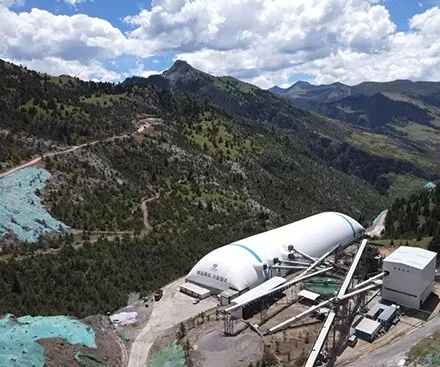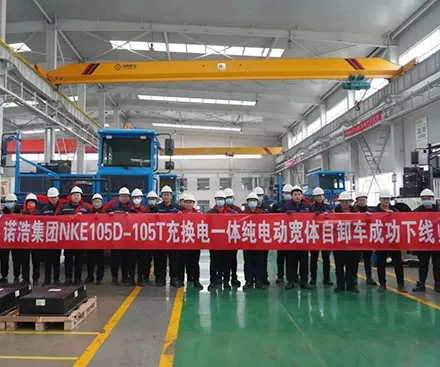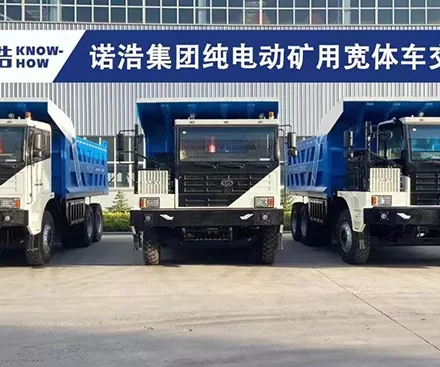As technology continues to advance, the construction industry witnesses the evolution of excavators, with electric and hydraulic variants gaining prominence. Understanding the differences between these two types of excavators is crucial for making informed decisions in the construction sector. This article explores the distinctions between electric and hydraulic excavators, shedding light on their respective advantages and applications.
The biggest difference between these 2 machines are their arms. A hydraulic excavator bends its arm to operate the bucket on the end, while the a electric rope shovel uses its two large arms to operate the bucket on the end by stretching the cable wires.
Electric excavators, as the name suggests, are powered by electricity. They rely on electric motors to drive hydraulic pumps that, in turn, power the excavator's movements and functions. This makes them an eco-friendly alternative, with zero emissions at the point of operation.
1. Environmental Friendliness: The primary advantage of electric excavators lies in their lower environmental impact. They produce no exhaust emissions during operation, contributing to a cleaner and greener construction site.
2. Reduced Operating Costs: Electric excavators tend to have lower operating costs compared to their hydraulic counterparts. With fewer moving parts and simplified maintenance requirements, they can offer cost savings over the long term.
3. Quieter Operation: Electric wheel excavators operate more quietly than hydraulic ones, reducing noise pollution on construction sites. This can be particularly beneficial in urban areas where noise regulations are stringent.
NWE560V 350kwh Electric Excavator
Hydraulic excavators, on the other hand, are powered by hydraulic systems that use fluid pressure to drive the machine's movements and functions. These excavators have been a staple in the construction industry for decades, known for their robustness and versatility.
1. Power and Performance: Hydraulic excavators are renowned for their power and performance. The hydraulic systems provide high torque, enabling them to handle heavy loads and challenging terrains with ease.
2. Versatility: Hydraulic excavators are highly versatile and can be equipped with a variety of attachments, such as buckets, grapples, and hydraulic breakers. This adaptability makes them suitable for a wide range of construction tasks.
3. Durability: Built for rugged conditions, hydraulic excavators are known for their durability. They can withstand harsh environments and are often the preferred choice for heavy-duty applications.
The most apparent difference lies in the power source. Electric excavators rely on electricity, typically from the grid or an on-board battery, while hydraulic excavators are powered by diesel engines that drive hydraulic systems.
Electric excavators are considered more environmentally friendly due to their lower emissions during operation. Hydraulic excavators, powered by diesel engines, produce exhaust emissions and contribute to air pollution.
While electric excavators may have higher upfront costs, they often provide long-term savings in operating and maintenance costs. Hydraulic excavators may have lower initial costs but can incur higher fuel and maintenance expenses over time.
The choice between electric and hydraulic excavators often depends on the specific application. Electric excavators are well-suited for indoor or urban projects where environmental concerns and noise regulations are paramount. Hydraulic excavators excel in outdoor, heavy-duty applications where power and versatility are critical.
When deciding between electric and hydraulic excavators, it's essential to evaluate your project's requirements and environmental considerations. If sustainability and reduced emissions are priorities, electric excavators may be the ideal choice. For heavy-duty outdoor tasks that demand power and versatility, hydraulic excavators are likely the better option.
In conclusion, the choice between electric and hydraulic excavators boils down to the specific needs of your construction project. Both types come with their own set of advantages, and understanding these differences will empower you to make an informed decision.
If you're ready to explore the options available or have specific questions about excavators, don't hesitate to contact us. Our team of experts is here to assist you in finding the right excavator or connecting you with a reliable supplier for your construction equipment needs.

Jul. 23, 2022
View More
Jun. 15, 2022
View More
Jun. 01, 2022
View More